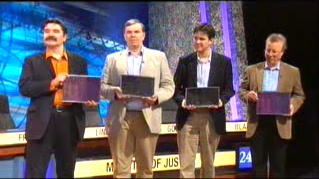Weaver's Week 2008-04-27
Two of the new shows for Saturday night are under the spotlight this week.
Contents |
The Kids Are All Right
Endemol (or one of its shells), BBC1, 5.40 Saturday
Meet, if you will, seven of the country's smartest young talents. These children – aged between 9 and 15 – are evidence that the country's future is safe and secure. There are future doctors, sportspeople, playwrights, and prodigies. Talent comes out of their every pore.
Meet, if you would, John Barrowman. This Glaswegian is, if anything, evidence that the BBC's future success depends exclusively on children's department productions. The former host of The Movie Game and Live And Kicking has spent many years appearing in musical theatre, and readers will recall his triumphant return to Saturdays last year, as one of the judges on Any Dream Will Do. Though we've not seen it, we understand that Mr. Barrowman has taken his acting talents to another children's department production.
And meet four members of the public who have been dragged in with the glittering prospect of thousands of pounds. They'll win that money if, and only if, they can beat the children in a sequence of challenges. Note that we didn't say "a sequence of mental, physical, skill, and psychological challenges". There is no physical activity involved in the tests, which is probably fair, given the way the human body grows over time. Nor is there any skill involved other than bashing a buzzer faster than the opponent. So, this isn't ever going to pass for the Friends Like These revival hosted by a third-choice Antan Dec.
The children are asked to stand in a faintly ludicrous pose, in front of the show's logo, while Barrowman talks to the team, displaying his rich Scottish burr in a natural conversational style. Actually, that's nonsense: Barrowman has continued to use an accent he picked up while living in Indiana, and doesn't so much converse with the members of the public as shout at them. It gets rather tiresome, rather quickly.
Mercifully, the chatter is brief: regrettably, the rest of the show is just as loud as the opening moments. Round one is the same every week: the producers give the team £5000 for no adequately explored reason. Is it a reward for turning up, compensation for having to endure Barrowman and an audience whose volume knob has been cranked up to ten? No matter, because the young stars want a slice of the action. Four of them will be selected to play, one against each member of the team. It's general knowledge questions, on the buzzer, first to give two correct answers wins. If the older person wins, nothing happens; if the child is victorious, £1000 vanishes from the prize fund.
This repeats for all four members of the public. And, if we're being honest, this opening round goes on for far too long. Barrowman can't resist the opportunity to stamp his mark all over the show, but his efforts consist only of dragging out the proceedings to an absurdly slow pace. We're wondering if we should put in a call to the Match Of The Day studio, warning Gary and Alan that they might not get on this side of midnight.
Eventually, the opening round completes, and we've spent something like ten minutes quibbling over four thousand pounds. It's a long time over something that's almost completely inconsequential to proceedings. Rounds two, three and four follow a similar procedure. The team have split themselves into a pair and two singles: one of the individuals will play in round two, the pair in round three, and the last person in round four. They'll play against one or two of the children: each child will play at least one game, so only one of them will play twice. The challenges here are for more significant amounts of money: the opponent's age, multiplied by £1000. The two-player game is played for the age of the older player.
We've seen a lot of a game testing observation and memory recall: a montage of video clips complete with additional bits from the production team (shapes appearing in view, words popping up for no reason) gives questions about what was seen, and in what order. The two-player game tends to be another test of knowledge, picking out the correct answers from a number of plausible and implausible ones. And there's a game that's been discarded from Test The Nation The National How Good Are You At Doing IQ Tests Test, in which the players must work out the symbol to complete the sequence, or which word or sum fits.
This section works better than the first, but it's hard to think of something that doesn't work better than the opening section. The viewer is able to play along with the challenges at home, and the solo games are timed to have just 60 seconds of questions. On the other hand, these games are perhaps too short, and Barrowman's continual exposition of the rules and reminder of the situation manages to extract the tension from the situation.
At the end of these rounds, the team will have an amount of money. It could be as low as £1000, it could be as much as £47,000. Whatever it is, they'll only get to win the cash if they can collectively beat the youngsters. The contestants are allowed to choose their order, the children will appear in ascending order of age. One by one, they step forward to their podium, and are asked a general knowledge question. The public team can choose between two categories. Whoever provides the correct answer will remain on stage; the other player is eliminated, and is replaced by the next person from their team. The team to have a player left on the stage when the others have all lost is the winner; only if the public wins this battle does the side take its money home. As a final round, it's a moderately satisfactory format, no better and no worse than when it appeared in Extinct: The Quiz a year and a half ago.
As ever in Endemol productions, while the games appear to be fair, the house has constructed the rules so that it enjoys a distinct advantage. The pairing of child to game in the middle section of the show is done by the producers. It's only to be expected that they put their best people forward for these games, and give the others their moment in the sun on the lesser challenge of the opening round. Again, the producers are able to match their contestant to the member of the public. The show is, in effect, a general knowledge quiz with some other elements, and we can be sure that the youngsters were selected for their wide-ranging knowledge. Maybe their specialist subjects pop up in the last round. We cannot call all of this cheating, for the rules are known to both sides before the game begins, and if the public can't work them out for themselves, that is their problem.
The show does suffer from one inherent problem that no amount of warning gets over: it's not particularly good. For starters, we never know quite which team we should be rooting for. Is it the young stars, able to go anywhere, do anything, and beat the old fogies? Should we root for the older generation, whose experience and wisdom could tame these whippersnappers? It would, perhaps, be an easier decision if the young team was playing for its own benefit, or for the benefit of their schools. They're not, and the money saved goes straight back to the production budget.
We can make some minor suggestions to improve the show, particularly the final round: if a youngster has played in the first round, and lost 2-0, then they might be eliminated from the final round straight away. But the major problem is that the show never quite recovers from its deathly-dull opening. Almost half-way through the show, we're still quibbling over the odd thousand pounds, when there are games for ten times that amount to come. The big-money games are zipped over by comparison, and the final is heavily rigged in one direction. We don't need Barrowman to shout at us every ten seconds with a reminder of how much the game is for. We don't even get to build up an Eggheads-like knowledge of the young stars so that we can know their strengths and weaknesses, for the young team changes each week.
The young competitors may be all right, but in our style book, "kids" are goats, and the show would have been more honest if it had stuck to the working title The Swot Team. At least they don't embarrass the grown-ups any more by making them repeat humiliating catchphrases, like another master of shame does.
All-Star Mr And Mrs
Celador for ITV, 7pm Saturday
In the beginning, there was the institution of marriage. Contrary to popular myth, this wasn't invented by any god, but was a means for the male of the species to ensure that the progeny they thought were theirs were in fact theirs, and not the milkman's. Very shortly after observing the invention of marriage, God created Sion a Sian, a gentle little quiz about how well husbands knew their wives, and wives knew their husbands, and it made for loads of cheap and easy television. Derek Batey made great television, but a revival hosted by Julian Clary didn't make such a good fist of things.
Now, the traditional format is back, except that members of the public are no longer invited to compete. Only those people who are famous, or have a regular show on ITV, get on the show. And the traditional rule that the contestants should have been though a marriage ceremony has been relaxed: long-term relationships are sufficient to qualify, and homosexual couples – who are not allowed to marry in the UK – can also appear.
The show is now hosted by Fern Britton and Phillip Schofield; the duo have hosted the This Morning programme for some years, and have worked out a chemistry between themselves. They're not a married couple, they just seem like it at times. The beginning of the show is the traditional isolation booth, where one of the couple is placed out of earshot and blindfolded while their other half is asked some questions about their relationship. If the isolated person can give the same answer, they score a point. We'll repeat this for all three couples, and we'll see a short film about their home life.
The second round is something new: the Battle of the Bats. The two players are put in adjacent booths, both able to see and hear the hosts, but not able to see each other. Each of them are given a table-tennis bat, one coloured blue, the other pink. The objective here is to guide a plane in to the right landing place... no it's not, the objective is to answer the questions identically. "Who is the better cook," asks Phillip (or is it Fern?) and the couple hold up their bats to indicate their preferred answer. Six of these questions, in short order, take the potential score to nine points.
Highest score amongst the three couples goes through to the final round, Whoever didn't go in the isolation booth earlier goes in now, and they collectively face four questions. Three are about the person on the outside, worth £5000 each, and one about the person on the inside, and it'll double the winnings from the first questions if answered correctly. The first question is very easy, so that all of the couples will leave with something for charity.
If The Kids Are All Right is just wrong, All-Star Mr And Mrs, Miss, Or Mr hits all the right notes. Phillip and Fern bring their chemistry to the show, and it has a positive effect on the guests, who are able to relax and enjoy their experience. That warmth comes through the screen, making this show a light and entertaining Saturday night programme. If there's one criticism, it's that it's perhaps too light for April, we'd expect to find this sort of programme shoring up the summer schedules.
This Week And Next
We regret to report the death of Humphrey Lyttelton, jazz trumpeter, raconteur, and perpetual host of I'm Sorry I Haven't a Clue. We intend to publish a full obituary notice in next week's edition.
The television BAFTA awards were presented last Sunday, and every game show nominated lost. The Audience award went to Gavin and Stacey, a comedy on BBC3, the Entertainment awards (show and personality) went to Harry Hill's TV Burp, and Attack of the Night landed on Simon Cowell. He was lambasted by Paul Watson, who has made fly-on-the-wall documentaries for many years, and won an award for his latest work. Mr. Watson said that Mr. Cowell is "a symptom of today, the bully factor. We've been taught to sneer. We have become a sneer culture. It does not make me laugh." Mr. Cowell has been seen leaning back in his chair, and letting the light glint off his artificially-whitened teeth.
University Challenge: The Professionals reached its conclusion, though the team from Salisbury Cathedral might have wished it had been taken off air for more snooker. They managed to draw a decorous blank in the first ten minutes of their semi-final, while the Ministry of Justice identified the original Radio 1 DJs, the patron saint of Hamburg, and quoted "What a tangled web we weave" on their way to taking a three-digit lead. Though Salisbury manages to keep their heads above water, it was clear that they were not going to catch up, and the Ministry of Justice's knowledge of corridors takes them to a 265-120 win.
The final pitted the National Physical Laboratory against the Ministry of Justice, and it's the latter who remembered that the follies of the Earl of Shrewsbury are amongst the many amusements at Alton Towers. One of the bonus questions goes on to ask about Magnus Pyke: there's a link in there, somewhere. The picture bonuses are flags of polities: countries that may or may not exist, depending on who you ask. We're thoroughly impressed that the MoJ get all 25 points, including Somaliland, though the side's Rob Linham is visibly kicking himself after failing to remember the "European Council", as distinct from the "Council of Europe". The NPL pick up a lot of starters in the general direction of physics, but there are enough lawyerly-political questions to ensure both sides have some on home territory. In the event, the Ministry of Justice rather runs away with it in the final moments, winning 245-130.
We should note that Mr. Linham was a member of the St John's Oxford team that finished second in the 2001 contest. He's now been involved in sides that won seven shows; only Dorjan Sirola (winner of nine matches with Somerville Oxford in 2002 and the Bodelian Library in 2006) has won more University Challenge games in the BBC revival.
In ratings for the week to 13 April, Britain's Got Talent came back with a bang, scoring 9.45m. The Apprentice had 7.3m, and Mr and Mrs, Miss, Or Mr was seen by 6.55m. I'd Do Anything was badly hit by the success of Cowell's X Factor, reduced to 5.55m for the performances, and 6.05m for the results. A draw on the minor channels, with Come Dine With Me and The Apprentice You're Tired both taking 3m. Deal had 2.65m, UC The Professionals 2.5m.
On the digital tier, ITV2 rules Sunday night, with 1.165m seeing additional Scowell and Moron footage, and 870,000 seeing the third repeat of Britain's Got Talent in 24 hours. Come Dine With Me had 835,000 tuning in, while an ever-so-special Pop Idle US was beaten by QI, proving that the British prefer to watch Stephen Fry than Gordon Brown.
Some changes to the schedule: there will be a classic edition of I'm Sorry I Haven't a Clue on Radio 4 at 12.04 this afternoon, and a proper tribute to Humphrey Lyttelton at 9am on Wednesday. It may be repeated at 9.30 that evening. Before then, the first in a new series of Scrapheap Challenge (C4, 5.45 tonight) and Challenge's big new promotion, It's Not What You Know (9pm from Monday).
To have Weaver's Week emailed to you on publication day, receive our exclusive TV roundup of the game shows in the week ahead, and chat to other ukgameshows.com readers sign up to our Yahoo! Group.







